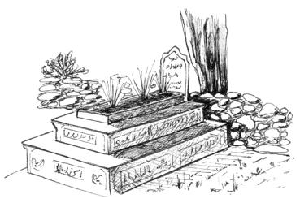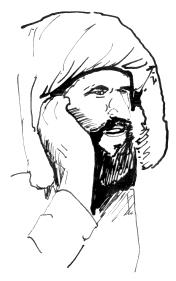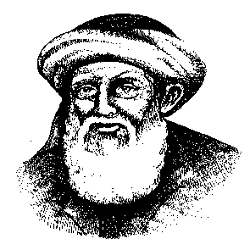Lesson Thirteen
Dialogue Thirten: Talking about the weather
A cloudy day
L: nun mosúm khu day. Today the weather is good. | نن موسم ښۀ دے. |
H: aw, du paróon na khu day. Yes, it's been good since yesterday. | او، د پرُون نه ښهٔ دے. |
L: wreze dee. staa tsu khayaal day, baaráan ba óoshee? There are clouds. What do you think, will it rain? | ورېځې دى. ستا څۀ خيال دے باران به وشى؟ |
H: baaraan sara ba fásul nu kharaabégee? Won't the rain spoil the crops? | باران سره به فصل نۀ خرابېږى؟ |
L: na, ku galúy oo-nu-shee, no baaraan ba fásul ta Dera faaydá wărkawee. No, if it doesn't hail then rain will give great benefit to the crops. | نه، که ږلۍ ونۀ شى، نو باران به فصل ته ډېره فائده ورکوى. |
H: khayr day, du galúy mosúm nu day. Don't worry, it's not the season for hail. | خیر دے، د ږلۍ موسم نۀ دے. |
A hot day
L: nun garmée da! It's hot today! | نن ګرمى ده! |
H: yaara Déra garmée shwa. Friend, it's become very hot. | ياره ډېره ګرمى شوه. |
L: aw ku na, du haaR myaast da, nwar Der tez day. Yes it is, it's the month of Har, the sun is very strong. | او کنه، د هاړ مياشت ده، نمر ډېر تېز دے. |
H: room koolúr dăr kara shta? Do you have a room cooler in your house? | رُوم کُولر در کره شته؟ |
L: aw, parósakaal me yo akhístay wo. Yes, I had bought one last year. | او، پروسکال مې يو اخستے و. |
H: kamrá tsínga da? yúkha da? How is the room? Is it cold? | کمره څنګه ده؟ يخه ده؟ |
L: aw, kamrá yúkha da. Yes, the room is cold. | او، کمره يخه ده. |
H: kho che bijlée láaRa shee, no byaa Der bud haalát joR shee. But when the electricity goes then the situation becomes very bad. | خو چې بجلى لاړه شى نو بيا ډېر بد حالت جوړ شى. |
L: loD shéDing mU Der zyaat tangawée. Load-shedding disturbs us a lot. | لوډ شېډنګ مو ډېر زيات تنګوى. |
NOTE:
The word for “sun” نمر - nwar has a traditional bookish way of being written in Pukhto that is pronounced in a different way than it is spelt. This is one of several words like this. Ask a friend what some of the others are.
Some useful vocabulary about the weather:
| droond baaráan (yaa) tez baaráan | heavy rain | درُوند باران (یا) تېز باران |
| 'áse mamoolee baaráan | only a light shower | هسې معمُولى باران |
| 'áse naráy baaráan | only a light rain | هسې نرے باران |
| baad (yaa) hawáa chalégee | wind blows | باد (یا) هوا چلېږى |
| toofáan | storm | طوفان |
| wáawra | snow | واؤره |
| párkha | dew | پرخه |
NOTE:
You will see both adjective and noun forms of “hot” and “cold.”
| Adjective | Noun |
|---|---|
gúram day. It's hot (adj.) ګرم دے | garmée da. It's hot (noun.) ګرمي ده |
yukh day. It's hot (adj.) یخ دے. | yukhnée da. It's hot (noun.) یخني ده |
Pronunciation drill
- Illustrating رګ - rg
| yo zburg saRay pu gUlbarg ke churgáan saatée. | A saintly man keeps chickens in Gulberg. | يو زبرګ سړے په ګُلبرګ کښې چرګان ساتى. |
| dwoo kara Der churgáan dee. | They have a lot of chickens at their house. | دوی کره ډېر چرګان دى. |
- Illustrating یا - yaa
| byaa de pyaalá ráawuRa? | Did you bring the cup again? | بيا دې پياله راؤړه؟ |
| ameer jaan rikhtyáa waayee. | Amir Jan is telling the truth. | امير جان رښتيا وائى. |
| zyaat kaar mú kawa! | Don't work too hard. | زيات کار مۀ کوه! |
- Practicing غ - gh and kh - خ
👆 Work on this tongue twister with your helper. The goal is to say the phrase clearly.

Changing verbs to the passive voice
Transitive verbs can be changed to the passive voice by adding the auxiliary verb کېدل - kedúl (to become) to the infinitive form of the verb.
The auxiliary verb is conjugated depending on what tense you want to use. In the examples below we will use the present tense, کېږی - kegee.
| hágha DoDúy khoRúle kégee? | Is that bread being eaten? | هغه ډوډۍ خوړلې کېږى؟ |
| aw, wro wro khoRúle kégee. | Yes, it is being eaten slowly. | آو، ورو ورو خوړلې کېږى. |
| zmaa khat nun leekúlay kégee? | Is my letter being written today? | زما خط نن ليکلے کېږى؟ |
| aw, nun staa khat leekúlay kégee. | Yes your letter is being written today. | آو، نن ستا خط ليکلے کېږى. |
| daa kitáab lostúlay kégee? | Is this book being read? | دا کتاب لوستلے کېږى؟ |
| na, daa hets kala nu lostúlay kégee. | No, it will never be read. (Lit. '... is never being read'.) | نه، دا هېڅ کله نۀ لوستلے کېږى. |
| qamées me nun ganDúlay kegee? | Is my shirt being sewn today? | قميص مې نن ګنډلے کېږى؟ |
| aw, nun ganDúlay kégee. | Yes, it is being sewn today. | آو، نن ګنډلے کېږى. |
| kapRé tsu wakht weenzúle kégee? | When are the clothes being washed? | کپړې څۀ وخت وينځلې کېږى؟ |
| oos weenzúle kégee. | They are being washed now. | اوس وينځلې کېږى. |
| TeekiTóona chărta wărkawúlee kégee? | Where are the tickets being given out? | ټيکټُونه چرته ورکولی کېږى؟ |
| pu de dookáan ke wărkawúlee kégee. | They are being given out in this shop. | په دې دُوکان کښې ورکولی کېږى. |
| moong leedúlee kégoo. | We are being seen. | مُونږ ليدلی کېږُو. |
| taaso wahulee kégey? | Are you being hit? | تاسو وهلی کېږئ؟ |
NOTES:
In the passive voice the recipient of the action is the subject of the sentence.
Unlike English, the agent is not mentioned. For example, the phrase “the clothes are washed by Mary” becomes “the clothes are washed” in Pukhto. The verb indicates a change in the state of the clothes, not who is performing the action.
In Pakistani Pukhto when making the passive voice we add a tail (ـے - -ay) on the end of the verb root. This tail is inflected based on the gender and number of the subject. These inflections work exactly the same as they adjectives inflections that we saw earlier, and as the past participle inflections that we will see later.
- ـے - -ay if the subject is masculine singular
- ـی - -ee if the subject is masculine plural
- ـې - -e if the subject is feminine (sing. or plur.)
Compound transitive verbs are made passive in exactly the same way in the present, by adding کېدل - kedul (to beome), (as seen in the first two examples below), or by using an intransitive equivalent of the compound verb (as seen in the third and fourth examples below).
| zu daa ghwákha nu pre kawum. | I am not going to cut this meat. | زۀ دا غوښه نۀ پرې کوم. |
| oos daa ghwákha nu pre kawule kégee. | This meat is not being cut now. (passive) | اوس دا غوښه نۀ پرې کولې کېږى. |
| zmaa qamées oos istrée kawée? | Is he ironing my shirt now? | زما قميص اوس اِسترى کوى؟ |
| aw, staa qamées oos istrée kégee. | Yes, your shirt is being ironed now. (passive) | آو، ستا قميص اوس اِسترى کېږى. |
Passive ideas using intransitive verbs
To express passive ideas, people often use the intransitive forms of compound verbs instead of making the transitive forms passive.
For example, to make the transitive compound verb جوړول - joRawul (to make/fix) passive you would say جوړولے کېږی - joRawulay kégee (it is being fixed). However, you can also express a similar idea by using an intransitive compound verb جوړېدل - joRedúl (to be made/fixed).
| moTúr de joRawúm. | I am fixing your car. | موټر دې جوړوم. |
| moTúr de joRégee? | Is your car being fixed? | موټر دې جوړېږى؟ |
| haghá oos largée maatawée. | He is cutting the wood now. | هغه اوس لرګى ماتوى. |
| largée maatégee. | The wood is being broken. | لرګى ماتېږى. |
| khaansaamá ghwáwa pakawée. | The cook is cooking the meat. | خانسامه غوښه پخوى. |
| ghwákha pakhégee. | The meat is being cooked. | غوښه پخېږى. |
| nun sipyáake swazawúm. | I am burning dung-cakes today. | نن سپياکې سوزوم. |
| staa sipyáake swazégee? | Are your dung-cakes burning? | ستا سپياکې سوزېږى؟ |
| lateefá wréjze tayaarawée. | Latifa is preparing the rice. | لطيفه ورېژې تياروى. |
| wréjze tayaarége. | The rice is being made ready. | ورېژې تيارېږى. |
| tu mewa hum khartsawé? | Do you also sell fruit? | تۀ مېوه هم خرڅوې؟ |
| pu de baazáar ke mewa hum khartségee? | Is fruit also being sold in this market? | په دې بازار کښې مېوه هم خرڅېږى؟ |
A comparison of transitive and intransitive forms of compound verbs
| Transitive | Intransitive |
|---|---|
istimaalawúl to use اِستعمالول | istimaaledúl to be used اِستعمالېدل |
pakhawúl to cook پخول | pakhedúl to be cooked پخېدل |
tayaarawúl to prepare تيارول | tayaaredúl to be prepared تيارېدل |
joRawúl to fix جوړول | joRedúl to become fixed جوړېدل |
khartsawúl to sell خرڅول | khatsedúl to be sold خرڅېدل |
zaRawúl to make old زړول | zaRedúl to get old زړېدل |
maatawúl to break ماتول | maatedúl to become broken ماتېدل |
Using transitive and intransitive compound verbs
| zu du khob na paatségum. | I am getting up from sleep. | زۀ د خوب نه پاڅېږم. |
| zu haghá du khob na paastawúm. | I am waking him up from sleep. | زۀ هغه د خوب نه پاڅوم. |
| zooy de wăle Der shărmégee? | Why is your son being so shy? | زوئ دې ولې ډېر شرمېږى؟ |
| wăle hágha halúk shărmawee? | Why is he shaming that boy? | ولې هغه هلک شرموى؟ |
| zmaa loor óodu kégee. | My daughter is going to sleep. | زما لُور اُودۀ کېږى. |
| zu khpúla loor óodu kawúm. | I am putting my daughter to sleep. | زۀ خپله لُور اُودۀ کوم. |
| zu la taa na khufa kégum. | I am getting upset at you. | زۀ له تانه خفه کېږم. |
| tu wăle maa khufa kawé? | Why are you making me upset? | تۀ ولې ما خفه کوې؟ |
The prepositions په شان - pu shaan, غوندې - ghwunde, لکه - lăka (lafa), داسې - daase and په رنګ - pu rang (like, as)
| tu zmaa pu shaan ye. | You are like me. | تۀ زما په شان يې. |
| zooy de zmaa du zooy pu shaan day. | Your son is like mine. | زوئ دې زما د زوئ په شان دے. |
| du de qalúm pu shaan noor qalumóona shta? | Do you have other pens like this one? | د دې قلم په شان نور قلمُونه شته؟ |
| spogmúy du nwar ghwunde nu da. | The moon is not like the sun. | سپوږمۍ د نمر غوندې نۀ ده. |
| spay me lăka du shărmúkh day. | My dog is like a wolf. | سپے مې لکه د شرمخ دے. |
| lăka du wugee azmarée DoDúy khorée. | He eats food like a hungry lion. | لکه د وږى ازمری ډوډۍ خورى. |
| lăka du lewanée khabúre kawée. | He talks like a madman. | لکه د لېونى خبرې کوى. |
| staa loor zmaa du loor pu shaan da. | Your daughter is like mine. | ستا لُور زما د لُور په شان ده. |
| haghá staa pu rang day. | He is like you. | هغه ستا په رنګ دے. |
| staa aadutóona zmaa pu shaan dee. | Your habits are like mine. | ستا عادتُونه زما په شان دى. |
| staa pu mUlk ke hum daase yukhnee shta? | Is it as cold as this in your country? | ستا په ملک کښې هم داسې يخنى شته؟ |
| wrejze ba wăr-la daase pakhawe. | Make the rice for him like this. | ورېژې به ورله داسې پخوې. |
NOTE:
Both په شان - pu shaan and په رنګ - pu rang can describe similarities in behavious or physical appearance.

Comprehension drill: Learning colours
👆 Arrange several objects of different colours around the room and have your teacher instruct you to do different things with the objects dependent on their colour. For example, put a yellow pencil in your pocket! Throw the red ball to me!
Modifiers:
Light
Dark
Memorising moments
Colours in different genders and number
| m. s. | m. pl. | f. s. | f. pl. | |
|---|---|---|---|---|
black | tor تور | tor تور | tóra توره | tóre تورې |
gray | khuR خړ | khuR خړ | khuRa خړه | khuRe خړې |
yellow | zyaR زيړ | zyaR زيړ | zyaRa زيړه | zyaRe زيړې |
white | speen سپين | speen سپين | spéena سپينه | spéene سپينې |
red | soor سُور | sru سُور | sra سره | sre سرې |
green / blue | sheen شين | shnu شنۀ | shna شنه | shne شنې |
matalóona
note: Sodum is a vilage near Mardan.
Rahman Baba
